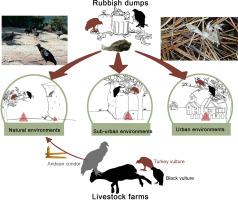Science of the Total Environment ( IF 8.2 ) Pub Date : 2020-09-21 , DOI: 10.1016/j.scitotenv.2020.142421 Fernando Ballejo , Pablo Plaza , Karina L. Speziale , Agustina P. Lambertucci , Sergio A. Lambertucci

|
Rubbish dumps can become an important environmental source of plastic. Several species feed on organic waste from these sites, but at the same time are exposed to non-organic materials. Species that can gather food in these sites might at the same time disperse waste consumed, but this has rarely been evaluated. We compare the occurrence of plastic debris in regurgitated pellets of three sympatric vultures from northwest Patagonia, Andean condors (Vultur gryphus), black vultures (Coragyps atratus) and turkey vultures (Cathartes aura), foraging in different degrees of humanized sites. We also evaluate the influence of rubbish dumps in the presence of plastic debris in pellets of the studied species and their potential role in spreading plastic to the environment. Most synthetic material present in pellets was plastic. Pellets of Andean condors, which avoid disturbed anthropic sites in this area, showed almost no plastic debris compared with the other sympatric vulture species, suggesting an influence of the foraging habits on plastic ingestion. For black and turkey vultures, we found that dumps may be an important source of plastic. The occurrence of plastic debris in pellets of black vultures sampled in 2010 and 2020 increased, probably associated with the increase in urbanization and waste production in the study area. Avian scavengers were exposed to and are able to transport plastic to distant communal roosts generating “plastic islands”. It is necessary to reduce plastic generation and better waste management practices to avoid species and environments to be affected by this pollutant.
中文翻译:

秃鹰通过塑料摄取和分散可能会在自然区域中产生塑料岛
垃圾场可以成为塑料的重要环境来源。有几种物种以这些场所的有机废物为食,但同时又暴露于非有机物质。可以在这些地点收集食物的物种可能同时分散所消耗的废物,但是很少对此进行评估。我们比较了来自西北巴塔哥尼亚,安第斯秃鹰(Vultur gryphus),黑雕(Coragyps atratus)和火鸡兀鹰(Cathattes aura)的三只同伴秃的回潮颗粒中塑料碎片的发生率),在不同程度的人性化地点觅食。我们还评估了在所研究物种的颗粒中存在塑料碎片的情况下垃圾场的影响以及它们在将塑料传播到环境中的潜在作用。颗粒中存在的大多数合成材料是塑料。安第斯秃鹰的药丸避免了该地区的人类活动地点受干扰,与其他同伴秃v物种相比,几乎没有显示出塑料碎片,这表明觅食习惯对塑料摄入有影响。对于黑色和火鸡秃鹰,我们发现垃圾场可能是塑料的重要来源。在2010年和2020年采样的黑色秃pellet颗粒中,塑料碎片的发生增加了,这可能与研究区域的城市化和废物产生的增加有关。鸟类的清道夫被暴露并能够将塑料运输到产生“塑料岛”的遥远的公共栖息地。有必要减少塑料的产生并采取更好的废物管理措施,以避免物种和环境受到这种污染物的影响。











































 京公网安备 11010802027423号
京公网安备 11010802027423号